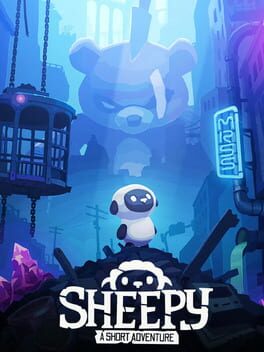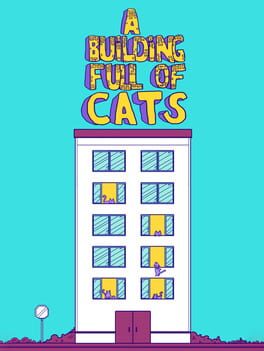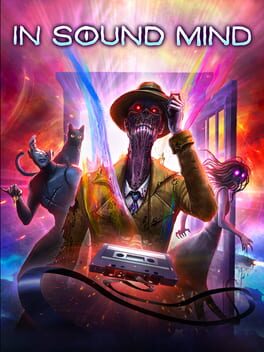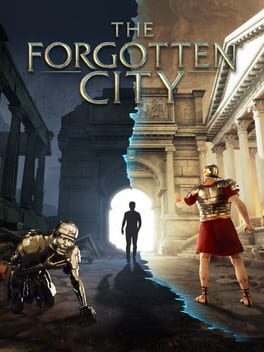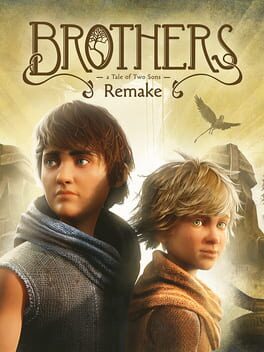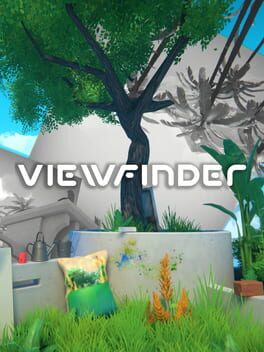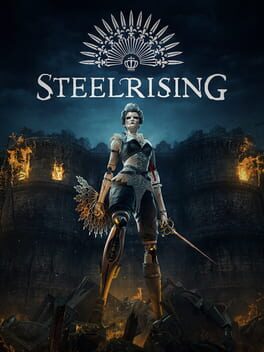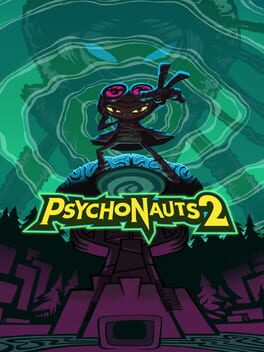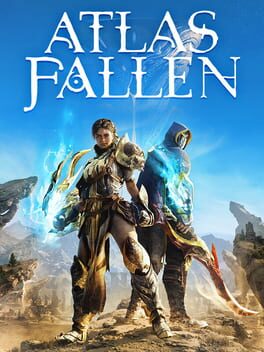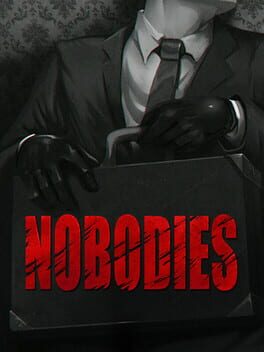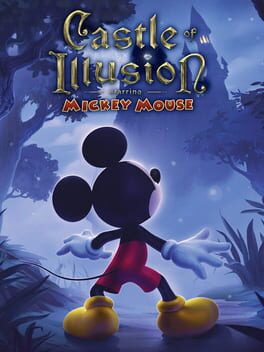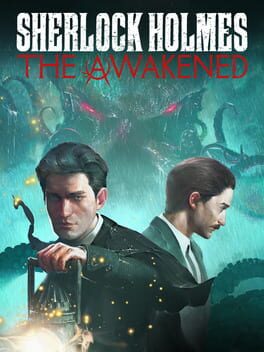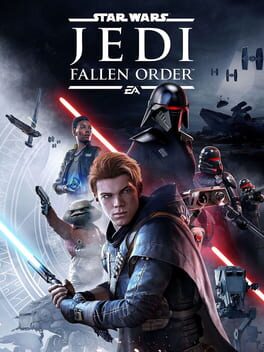ResidentRed
Even though it was free, Sheepy: A Short Adventure felt like it should have come with a price tag. Its quick runtime offered a thoroughly enjoyable experience, with a handful of chapters that had their own platforming challenges as well as powers to overcome them. There were even some collectibles and secrets to find. It had the whole package, albeit a condensed one with a confusing narrative.
What added to it was the seamless integration of music into the gameplay, one chapter in particular going all out on being epic. It's hard to believe it was developed by one person.
What added to it was the seamless integration of music into the gameplay, one chapter in particular going all out on being epic. It's hard to believe it was developed by one person.
In 2022 I went through one of the toughest times in my life, and A Building Full of Cats helped me out. I didn’t want to think, I just wanted something pretty and no-stress, and as it turned out, finding cats was pretty therapeutic.
There were several levels, the total number of cats in the hundreds, some hiding away. The artwork was colourful and great to look at, with full marks on being cute.
I immediately went into A Castle Full of Cats because I couldn't get enough.
There were several levels, the total number of cats in the hundreds, some hiding away. The artwork was colourful and great to look at, with full marks on being cute.
I immediately went into A Castle Full of Cats because I couldn't get enough.
2021
I went in with no expectations and was surprised by how much I liked In Sound Mind. With indie horror you never know what you’re going to get—an asset flip with nothing but loud noises or something with actual substance? This fell into the latter, impressively so, with a decent story involving mental illness, plus combat and puzzles, as well as a number of chapters with different environments and bosses associated with them. There was even a pesky antagonist that stalked the player throughout the entire game; I noticed him peeking around corners, or watching from a bit away. It was extremely effective.
And sometimes it’s the little details that really stand out. Each chapter had a song attached to it, and I love when music is implemented in such a way (Alan Wake 2 comes to mind).
And sometimes it’s the little details that really stand out. Each chapter had a song attached to it, and I love when music is implemented in such a way (Alan Wake 2 comes to mind).
2021
Time loops can often be messy and convoluted, but The Forgotten City tackled such a concept with fantastic writing that delved into philosophy and history. The visuals depicted a Roman city with a curse bearing over its people, and the goal was to get to the bottom of said curse that would inevitably kill the population if one person sinned. With each loop it became possible to stave it off for longer, but never forever, since humans love being naughty. It was a great setup and I loved its focus on narrative—there was a lot of talking, and that was okay with me.
It didn’t give step by step directions on how to progress, which is in stark contrast to how the majority of "detective" games do the work for you. It was trial and error until all the pieces fit, certain moral decisions required to get by. Combat was optional and even then, it was bare-bones and probably didn’t even need to be there. I really enjoyed it; I'll always be on the lookout for titles like this.
It didn’t give step by step directions on how to progress, which is in stark contrast to how the majority of "detective" games do the work for you. It was trial and error until all the pieces fit, certain moral decisions required to get by. Combat was optional and even then, it was bare-bones and probably didn’t even need to be there. I really enjoyed it; I'll always be on the lookout for titles like this.
2023
I dumped a lot of hours into Starfield while trying most, if not all, it had to offer. This included the completion of faction questlines as well as a number of side quests, outpost and ship building, acquiring every power and even furnishing an apartment. At the end of it all, I can now comfortably say that this divisive game didn’t blow me away.
In isolation it did some things well—the dogfights were fun and some of the storytelling was compelling, and I guess it was technically possible to fly through space, but as a whole package it was somewhat of a husk. Focusing on realism and scope did it no favours when most of it was dead; there’s obvious issues with translating realism into a videogame that's supposed to be fun. As it was, I felt no desire to explore the nothingness that was most planets; the excitement of what lay ahead was missing, more often than not I felt very little. Due to the scope—very much quantity over quality—it relied on fast travel far too much, but that’s just another complaint on a long list of them.
To sum up, there were highs and lows, even some greatness amongst cumbersome systems.
In isolation it did some things well—the dogfights were fun and some of the storytelling was compelling, and I guess it was technically possible to fly through space, but as a whole package it was somewhat of a husk. Focusing on realism and scope did it no favours when most of it was dead; there’s obvious issues with translating realism into a videogame that's supposed to be fun. As it was, I felt no desire to explore the nothingness that was most planets; the excitement of what lay ahead was missing, more often than not I felt very little. Due to the scope—very much quantity over quality—it relied on fast travel far too much, but that’s just another complaint on a long list of them.
To sum up, there were highs and lows, even some greatness amongst cumbersome systems.
Brothers: A Tale of Two Sons Remake was great not only for those wanting to revisit the now eleven year old game, but for people like me who never had the pleasure. Sure, the original is still available to this day, but it never came to mind until news of the remake, so why not start there? It was beautiful in terms of visuals and mixed the fantastical with darker themes, sometimes at whiplash speed. It was easy to fall into the wholesome trap only to be reminded of tragedy seconds later. For this reason I didn’t entirely like the ending, “bittersweet” didn’t even begin to cover it. I still feel bummed out.
For solo play the controls took some getting used to, but moving the characters individually yet simultaneously with each having their own unique interactions was pretty good—I also appreciated the other little details, such as the little brother being slower.
For solo play the controls took some getting used to, but moving the characters individually yet simultaneously with each having their own unique interactions was pretty good—I also appreciated the other little details, such as the little brother being slower.
2023
Viewfinder encouraged me to think outside the box and consider perspective in a new way, but even before tackling its array of wild and wonderful puzzles, I found myself admiring the vibrancy in every level—seriously beautiful with a lot of little hidden details that had no purpose other than being fun. Manipulating terrain / objects never felt better; it’s obvious the devs had a good time and wanted their players to as well.
While the story didn’t completely grasp me, I did become attached to Cait (a companion throughout the game), and that was enough to render me emotional in the end. I just wish the last segment wasn't timed, as it went against the otherwise relaxing experience.
While the story didn’t completely grasp me, I did become attached to Cait (a companion throughout the game), and that was enough to render me emotional in the end. I just wish the last segment wasn't timed, as it went against the otherwise relaxing experience.
2022
Steelrising had an interesting concept of running around as an automaton in 1789 Paris, but in execution it was just another soulless souls-like, and one I didn’t much care for. While I enjoyed the enemy designs and, at times, the combat with the different weapon types, the frustrations came from getting around the maps. The barricades in particular, there were so many of them blocking paths and it was inconsistent on how to bypass them—some I could jump over, and some had invisible walls, it was a toss of the coin. The invisible walls were especially egregious when taking into account how it encouraged the use of the jump dash unlock. Suffice it to say, I hated how awkward it was to get around.
Another disappointment was the story; I found it dull. Every cutscene / conversation was hard to get through until I started skipping them all. It's a shame, BUT it's a good thing that others have enjoyed it where I didn't.
Another disappointment was the story; I found it dull. Every cutscene / conversation was hard to get through until I started skipping them all. It's a shame, BUT it's a good thing that others have enjoyed it where I didn't.
2021
Psychonauts 2 was the kind of platformer I adore, with wildly imaginative (replayable) levels, quirky characters, and just all round fun. With a larger “base” map, it also had several themed levels of venturing into people’s minds and confronting their inner demons, and my goodness, the absolute insanity. It often required the use of swappable psychic powers to get around environmental puzzles and to also find hidden collectibles.
I have a soft spot for games like this; bright, colourful, whimsical, humorous. Even with dealing with somewhat sensitive topics it did so in a beautiful and respectful way, and I found myself comforted while playing.
I have a soft spot for games like this; bright, colourful, whimsical, humorous. Even with dealing with somewhat sensitive topics it did so in a beautiful and respectful way, and I found myself comforted while playing.
2023
The most notable thing about Atlas Fallen was its movement—sand sliding and jumping—which remained fun throughout the playthrough. Each map was designed for mobility, and while the barren wastelands often didn’t offer much in the way of colourful spectacles, they were nevertheless wonderful to explore.
As for what else it offered, it wasn’t terrible, but wasn’t great either. It struck me as an old fashioned action game where it was comfortable not pushing boundaries or attempting to create a groundbreaking story. There were monsters, and the goal was to fight them, oftentimes by slowly whittling down their health. I won’t deny I had fun despite its faults, and thankfully it presented options when it came to armour and abilities (aka essence stones).
As for what else it offered, it wasn’t terrible, but wasn’t great either. It struck me as an old fashioned action game where it was comfortable not pushing boundaries or attempting to create a groundbreaking story. There were monsters, and the goal was to fight them, oftentimes by slowly whittling down their health. I won’t deny I had fun despite its faults, and thankfully it presented options when it came to armour and abilities (aka essence stones).
2016
A darker point and click puzzle game, Nobodies was all about cleaning up murder scenes (but don’t worry, the targets were terrorists), and that included hiding the bodies as well as getting rid of evidence. The locations were varied (hotel, prison, hospital, etc) and the solutions required thinking outside the box. It was possible to mess up and be caught by police, but thankfully it was generous in saving progress. I'd say the mistakes I made often had funny consequences therefore while the game encouraged trial and error, there was only really one correct solution to disposing of the bodies.
Unfortunately after a handful of levels with the scenes becoming more complex, I felt like it overstayed its welcome just a tad. I don't want to say I became bored, but my interest definitely dropped.
Unfortunately after a handful of levels with the scenes becoming more complex, I felt like it overstayed its welcome just a tad. I don't want to say I became bored, but my interest definitely dropped.
A remake of the 1990 original, Castle of Illusion was full of colour and whimsy. Each set of levels were split into three parts and unlocked through collecting diamonds, with varying themes and bosses. Everything was visually stunning and the controls were responsive; it felt great to move through levels, the platforming satisfying if a little challenging for the inexperienced (me). There were even a few cute outfits for Mickey, and I do like myself some outfits.
I’m pretty indifferent to anything Disney these days, but I can’t deny it played a big part in my childhood. It's not the powerhouse it used to be and obviously isn't a good company, but by goodness there's still a spark of magic.
I’m pretty indifferent to anything Disney these days, but I can’t deny it played a big part in my childhood. It's not the powerhouse it used to be and obviously isn't a good company, but by goodness there's still a spark of magic.
Yikes?
With a surprise release, The Short Message got a lot of people talking, and understandably so with it being related to Silent Hill. I jumped in with cautious optimism, thank goodness for that. The environments looked great, with the graffiti everywhere and the general atmosphere. The only thing I’d nitpick regarding the visuals was the character HAVING HER HAIR UNDER HER GLASSES? As a spectacled person I found it a bizarre design choice.
As for the meat, gameplay-wise it took a lot from other psychological horror titles with walking around doing very little. Repetitive chase sequences spiced it up a bit, with one chase in particular being a horrid experience. It reminded me of many indie games—unfortunate, yes, but it didn’t do a whole lot to stand out from the crowd and instead relied on the big name attached to it. The narrative on bullying and social media, while prevalent today, was extremely heavy-handed to the point the protagonist was downright unlikeable. Let's face it, depression is common, bullying is common, the pressure of social media is common; it didn't deserve praise for including all those topics in the shallow ways it did. People, real people, actually have nuance and depth.
With a surprise release, The Short Message got a lot of people talking, and understandably so with it being related to Silent Hill. I jumped in with cautious optimism, thank goodness for that. The environments looked great, with the graffiti everywhere and the general atmosphere. The only thing I’d nitpick regarding the visuals was the character HAVING HER HAIR UNDER HER GLASSES? As a spectacled person I found it a bizarre design choice.
As for the meat, gameplay-wise it took a lot from other psychological horror titles with walking around doing very little. Repetitive chase sequences spiced it up a bit, with one chase in particular being a horrid experience. It reminded me of many indie games—unfortunate, yes, but it didn’t do a whole lot to stand out from the crowd and instead relied on the big name attached to it. The narrative on bullying and social media, while prevalent today, was extremely heavy-handed to the point the protagonist was downright unlikeable. Let's face it, depression is common, bullying is common, the pressure of social media is common; it didn't deserve praise for including all those topics in the shallow ways it did. People, real people, actually have nuance and depth.
I liked The Awakened for the most part, but I understand some of its criticisms. I don’t believe it did a good job of introducing its mechanics, so as a new player to the Sherlock Holmes series I was completely lost in the beginning. The more I played, though, the more I understood how to piece together scenes and tie in evidence; eventually it was a non-issue.
Now, I didn’t expect a horror experience but rather a detective game with horror elements, and that’s what it was. I enjoyed following the trail of a cult, the supernatural left ambiguous, sanity and the loss of it prevalent in true Lovecraft fashion. It wasn't packed with action or anything like that, but a slow burn of attempting to unravel a mystery. It's just a shame I didn't much care for the ending.
Now, I didn’t expect a horror experience but rather a detective game with horror elements, and that’s what it was. I enjoyed following the trail of a cult, the supernatural left ambiguous, sanity and the loss of it prevalent in true Lovecraft fashion. It wasn't packed with action or anything like that, but a slow burn of attempting to unravel a mystery. It's just a shame I didn't much care for the ending.
I'm in the minority for not enjoying Jedi: Fallen Order. It didn't feel particularly fun, the story nor the characters sparking interest. I’ll even go so far as to say the tacked on Souls-like elements didn’t suit it—when you think of Souls games, what comes to mind? For me it’s the bosses which usually offer a spectacle as they’re supposed to be memorable and a big deal, but I find it hard to recall a single one here. Loot is generally a major factor as well when it comes to Souls-like, giving a sense of accomplishment over time, but that was missing altogether with Jedi: Fallen Order. It was just hard for the sake of jumping on that train.
What was left was just a whole lot of platforming, or rather, “parkour” that made me want to abandon the game, and I don't make a habit of doing that.
What was left was just a whole lot of platforming, or rather, “parkour” that made me want to abandon the game, and I don't make a habit of doing that.
